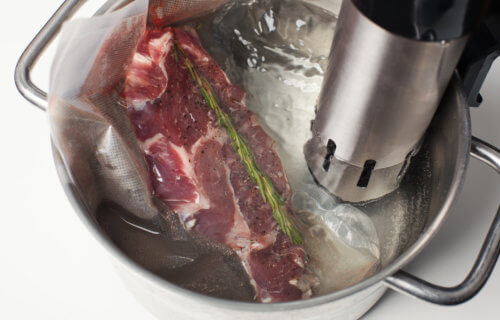WASHINGTON — Sous vide cooking, meaning “under vacuum” in French, has largely been reserved for gourmet restaurants for most of its existence. In recent years however, it’s making its way into more home kitchens. Characterized by vacuum sealing food in a plastic bag and slowly cooking it in warm water, researchers say this unique approach to cooking actually helps improve the digestibility of beef proteins.
Whenever a piece of meat is cooked for consumption, the heat causes meat proteins to undergo numerous changes connected to its structure like oxidation and aggregation. All of those changes make a big difference when it comes time for the body to break down and digest the meat into small peptides or amino acids for bloodstream absorption.
Chefs who cook meats via sous vide usually place the protein in water as hot as 140 degrees Fahrenheit. This comparatively low heat level, as well as low-oxygen conditions, facilitates “a tender, juicy, evenly cooked steak,” researchers note in a media release.
Researchers wondered if sous vide may also help with digestion in comparison to traditional cooking techniques like boiling or roasting. Both of those approaches require far hotter temperatures.
Why cooking beef sous vide is better for health
Better digestibility means better nutrition and fewer stomach problems, digestion issues, and pains. During the course of their studies, study authors analyzed two markers of protein oxidation in cooked meat.
This helped them discover that roasted meat carries the most oxidation, followed by boiled meat, and then sous vide. Sous vide also sparks less protein aggregation and fewer changes in general to the proteins’ structures.
Researchers recreated actual human digestion for this research by placing the meat in simulated gastric and intestinal fluids. When this occurred, the sous vide beef released more peptides than any other cooking method — thus improving digestibility considerably.
In conclusion, the research team says more studies are ultimately needed to determine how different meat cooking methods end up influencing the gut microbiome and overall health.
The study is published in the Journal of Agricultural and Food Chemistry.
